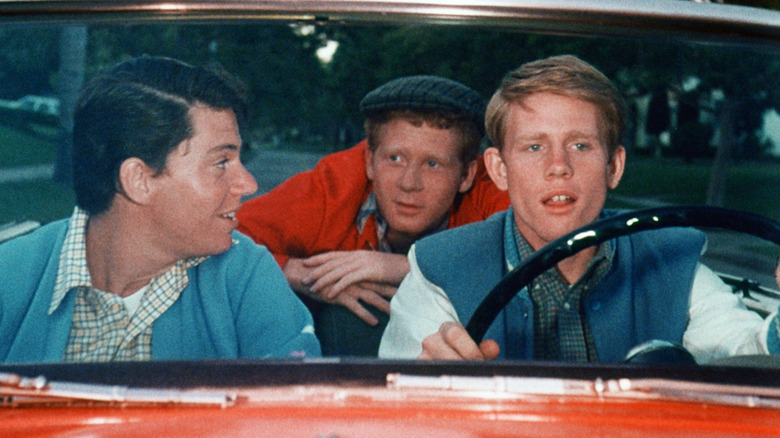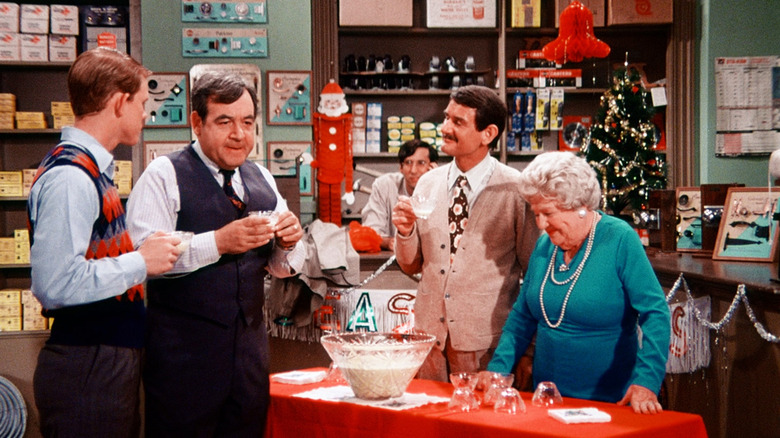The Happy Days Cast's Lawsuit Against CBS, Explained
Garry Marshall's 1974 sitcom "Happy Days" was a phenomenon. It started slow, but gained popularity over its first few seasons, and eventually lasted a massive 255 episodes over 11 seasons. It would spawn four spin-off shows in the form of "Laverne & Shirley," "Blansky's Beauties," "Mork & Mindy," and "Joanie Loves Chachi." One could even debate that the obscure angelic sitcom "Out of the Blue" counts, as it had a crossover with "Mork & Mindy." The series spawned piles upon piles of merch, attracting a wide audience of kids who weren't old enough to remember the time of the show's setting.
Set in the suburbs of Milwaukee, Wisconsin, in the mid-1950s, "Happy Days" tapped into Boomer nostalgia like nothing before, presenting the past (at least as far as white suburbanites were concerned) as a simpler, sillier, more idealized time. It was about relationship issues, friendships, family, and the act of just hanging out. It's easy to see George Lucas' 1973 film "American Graffiti" as an influence, and not just because both featured Ron Howard. Nostalgia for '50s and '60s car culture was rolling high, and entertainment makers were keen to exploit it. The show's popularity rocketed Howard to stardom, as it did its other leads — Anson Williams, Marion Ross, Erin Moran, Tom Bosley, Donny Most, and, of course, Henry Winkler as the greaser-with-a-heart-of-gold, Arthur "The Fonz" Fonzarelli.
But that fame didn't always come with the correct amount of compensation. Although the series went off the air in 1984, CBS (which took over ownership) continued to make a sizable amount of cash from the aforementioned merch. The actors' likenesses were used on T-shirts, slot machines, puzzles, lunchboxes, and Funko Pops, and in 2011, they found that they were not being paid properly for it. Reuters reported at that time that Most, Moran, Williams, Ross, and the estate of Bosley sued CBS for $10 million, wanting a cut of the studio's merchandise profits.
The cast of Happy Days sued for $10 million in merch profits
Henry Winkler and Ron Howard (likely busy with his directorial career) were not part of the aforementioned lawsuit. In the suit, the actors claimed that they were owed 5% of the sales of any piece of merchandise where their solo image was used, and 2.5% if their likenesses were used as part of a group shot. The merch included everything from fridge magnets to model cars to greeting cards. They were also being stiffed out of likeness rights for DVD box covers, where their images were used openly and plentifully. The actors claimed that the revenue CBS was earning from all this merch totaled in the millions, and that $10 million (collectively) would be adequate back pay. Moran's attorney Jon Pfeiffer, who represented all the plaintiffs, said that she got a payment of only $600 several years before, while the other actors all claimed to have received nothing.
CBS disagreed. The network looked into the matter and found that it had failed to pay their actors properly, but, by its own calculations, only had to pay out $8,500 or $9,000 to each of them. The total of $45,000 was much lower than the $10 million the actors were asking for.
Part of the case was an accusation of fraud against CBS, claiming that the network lied about contract details. That part of the case was eventually thrown out. CBS tried to throw out the case altogether, but wasn't able to. The case was about to go to trial in July 2012 when CBS, rather suddenly, decided to settle. The details of the settlement were reported by CNN, and it seems that each one of the actors, and Tom Bosley's widow, was paid around $65,000 each. It seems that the slot machine revenue wasn't that huge after all.
CBS said that its mistake was a run-of-the-mill breach of contract, and promised to pay the "Happy Days" actors their fair share, according to their contracts, from then on. One might assume that CBS has been as good as its word.

